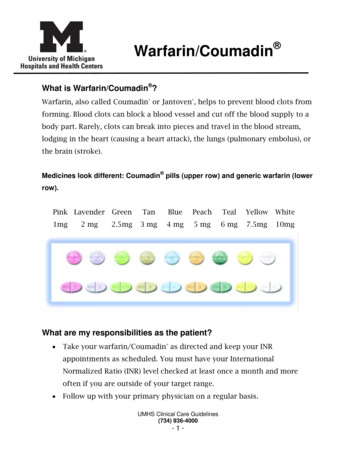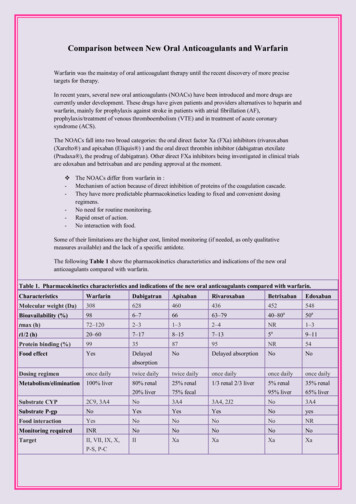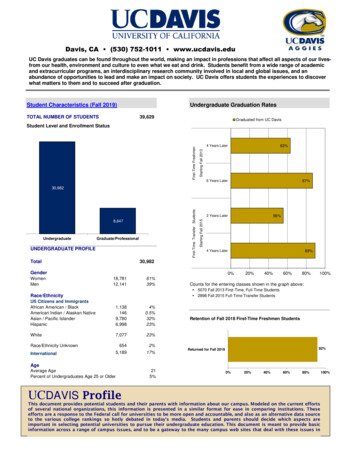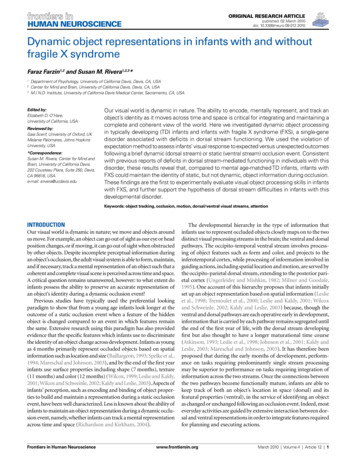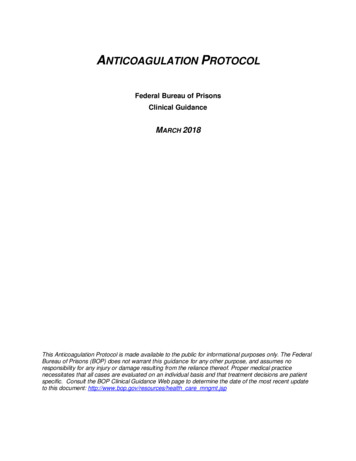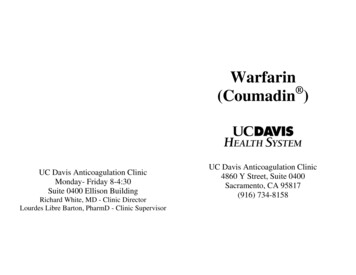
Transcription
Warfarin (Coumadin )UC Davis Anticoagulation ClinicMonday- Friday 8-4:30Suite 0400 Ellison BuildingRichard White, MD - Clinic DirectorLourdes Libre Barton, PharmD - Clinic SupervisorUC Davis Anticoagulation Clinic4860 Y Street, Suite 0400Sacramento, CA 95817(916) 734-8158
Important Points Take your warfarin exactly as directedGET YOUR INR CHECKED AS SCHEDULEDWatch for signs of bleedingKeep your diet consistentContact your Health Care Provider if you experience:o Difficulty breathing or chest paino Cough or throwing up bloodo A serious fall or head injuryo Illness, fever, or infection that worsenso Swelling or paino Weakness or dizzinessIf you miss a pill, DO NOT take an extra pill to catchup unless your Health Care Provider directs you toAvoid excessive alcohol use or binge drinkingDo not make any major lifestyle changes withoutconsulting your Health Care ProviderIF YOU ARE PREGNANT OR PLAN ONBECOMING PREGNANT DO NOT TAKEWARFARINIntroductionYou have been started on the medication warfarin(Coumadin ). While you are on this medication you willneed to be watched carefully. You will need to have regularblood tests and notify your health care provider of anyquestions. Your health care provider will work with you tokeep you safe and healthy while you are taking warfarin.The more you know about this medication, the better teamyou and your heath care provider will make together. Pleasetake some time to read all of the information in this booklet.What is warfarin (Coumadin )?Warfarin sodium is an anticoagulant. “Anti” means againstand “coagulant” means clotting. Sometimes this drug iscalled a blood thinner. An anticoagulant helps to preventclots from forming in the blood.
What does your warfarin (Coumadin ) look like?Why you need to take warfarin?Your body forms blood clots to help you stop bleeding.Sometimes your body may make a blood clot that you do notneed. Blood clots may form in veins, arteries or even in thechambers of your heart or on your heart valves.Some of the conditions for which warfarin is used include: Atrial fibrillation (afib) / stroke prevention Deep vein thrombosis (DVT) Pulmonary embolus (PE) Heart valve replacement Hip or knee replacement Heart attack Peripheral vascular disease (PVD)Tablet Strength1mg2mg2.5mg3mg4mg5mg6 mg7.5mg10mgTablet ColorPinkPurpleGreenTanBluePeachTealYellowWhite1mg 2mg 2.5mg 3mg 4mg 5mg 6mg 7.5mg 10mg
Taking WarfarinUse of Other MedicationsWhen warfarin is taken with other medicines, it can changethe way warfarin works. It is very important to talk withyour doctor about all of the other medicines that you aretaking, including over-the-counter medicines, antibiotics,vitamins, or herbal products.Some over-the-counter drugs that may affect warfarininclude: Aspirin or aspirin containing products Ibuprophen (Motrin or Advil) Naproxen (Aleve) Vitamin or herbal supplementsAlways take your pills as directed. The amount of warfarineach person needs is different and is based on a blood testcalled an INR (International Normalized Ratio) or protime.The amount of medication you take may change over time,based on this blood test. Warfarin needs to be taken at thesame time, usually in the evening. If you miss a dose take itas soon as you remember. If you don’t remember till thenext day, skip the missed dose and let you health careprovider know.Blood TestsWhen you start taking warfarin you may need a blood testevery day for a few days. Once your healthcare providerfinds the dosage that is right for you, the blood tests will beless frequent.The INR test measures how fast your blood is clotting andlets the doctor know if your dosage should change. If yourblood test is too high, you might be at risk for bleedingproblems. If it is too low, you might be at risk for formingclots. Your doctor has decided on a goal for your blood testthat is right for you. Because your dose is based on the INRblood test, it is very important that you get your blood testedwhen you are asked.
My Goal INR isDo I need to change my diet?What are the possible side effects?It is important to eat a balanced, consistent diet while takingwarfarin. Warfarin interacts with vitamin K (a vitamin foundnaturally in foods), so you need to keep vitamin K intakeconstant from day to day. Avoid sudden large increases ordecreases in your intake of foods high in vitamin K (such asbroccoli, cauliflower, cabbage, Brussels sprouts, spinach,and other green leafy vegetables).It is also important toavoid herbal products and dietary supplements that mayaffect vitamin K and warfarin unless approved by yourhealthcare providerSide effects with warfarin are not common, but bleeding isthe most common. Very minor bleeding may occur evenwhen your INR is in your goal range.This may include: Small bruises Slight gum bleeding when brushing teeth Occasional nose bleed Bleeding after a minor cut that stops within minutesIf you are experiencing something abnormal that you feelmay be caused by your warfarin , please contact your healthcare provider.Major bleeding includes: Red, dark, coffee colored urine Bowel movements that are red or look like tar Bleeding that does not stop after 10 minutes Vomit that is coffee colored or bright red A serious fall or hit on the headIF YOU EXPERIENCE ANY MAJOR BLEEDINGCONTACT YOUR DOCTOR OR GO STRAIGHT TOTHE HOSPITAL EMERGENCY ROOM.Alcohol can also affect your warfarin, but it does not meanyou must avoid all alcohol. Serious problems can occur withalcohol and warfarin if you suddenly change the amount ofalcohol you drink.
(Coumadin ). While you are on this medication you will arefully. You will need to have regular blood tests and notify your health care provider of any . Your health care provider will work with you to ou are taking warfarin. The more you know about this medication, the better team you and your heath care provider will make together. Please
